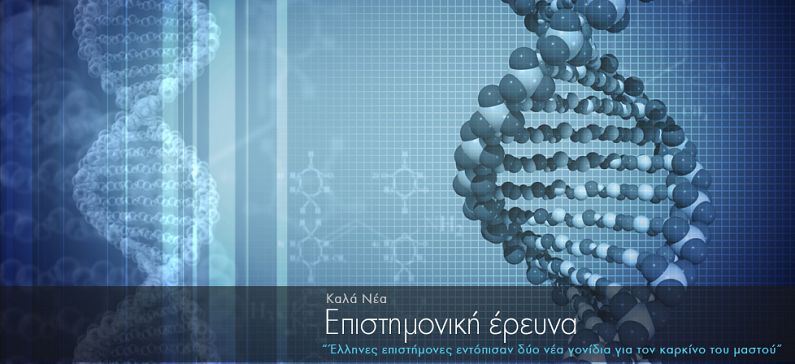
Greek scientists uncovered two new genetic risk factors
An international collaboration between dozens of worldwide cancer research institutes has added to the ever-improving understanding of breast cancer genetics and personal profiling of the disease by unearthing two new genetic variants associated with a higher risk for the women carrying them. Among the team were 3 Greek scientists.
The huge international collaboration analyzed the DNA of around 100,000 women with and without breast cancer.
The two genetic susceptibility biomarkers identified by the huge study are specific to a type of hormone-dependent breast cancer – estrogen receptor-positive breast cancer, the most common form. The newly uncovered genetic variants provide clues about how this breast cancer develops, and also represent factors that could be used to screen for the women who are at the highest risk.
Led by British researchers at the Institute of Cancer Research in London, massive pooling of scientific data was needed to identify the «single nucleotide polymorphisms» – small variations in the genetic code – that signalled breast cancer susceptibility among the DNA of around 100,000 women.
Three greek scientists participated, one of which is employed by a Greek institution: Drakoulis Giannoukakos from the Mollecular Diagnostics Laboratory of Democritos Athens, Helen Perrakis from the Institute of Cancer Research in London and Kyriaki Michailidou from the Center for Cancer Genetics Epidemiology in the School of Public Health of Cambridge.
Presented in the journal Human Molecular Genetics, the analysis used the DNA of around 86,000 women of European ancestry, 12,000 of Asian, and 2,000 of African ancestry. About half of the women under analysis had breast cancer.
The researchers believe that the two variants – labeled rs10816625 and rs13294895 – influence a gene known as KLF4, thought to be involved in the control of cellular growth and division. The study found that the increased risks of cancer presented by each of these polymorphisms were:
- For women carrying rs10816625, versus those without it, a 12% greater chance of developing breast cancer
-
For rs13294895, a 9% greater risk.







